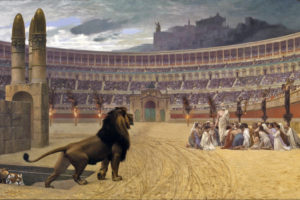In my previous blog-post I reluctantly responded to Christianity Today‘s front-page article “Why Trump Should be Removed from Office”. That made me think much about our calling as Christians in days like these, that is, our calling with respect to contemporary politics. In few places is that calling harder to understand than in contemporary America. How should the church position herself with regards to the state, and with political parties, platforms and leaders? And so, in my struggle to understand this issue I recalled the contents of a beautiful book that I have read last July in Africa. It is the autobiography of the former Anglican Archbishop of Kenya, David Gitari (1937-2013), published in 2014. Gitari was a man of great spiritual stature and integrity, and one of Africa’s first internationally renowned post-colonial Christian leaders.
In his article on Donald Trump in Christianity Today, its editor-in-chief Mark Galli is concerned about the same thing. He asks his readers to consider: “Remember who you are and whom you serve. Consider how your justification of Mr. Trump influences your witness to your Lord and Savior”. He challenges his readers to consider how the future going to judge them for either supporting or opposing Trump (or whoever)? That is the question Gitari was struggling with as well. That is what Dietrich Bonhoeffer was grappling with, returning to Germany from New York in the late 1930’s.
And never do we have the luxury of simply hiding till the storm is over. That is simply cowardice and will be judged even harsher. And so the question I have struggled with is this: “Is it überhaupt about the person, or is it about the office? Is it about his style and antics or about his policies and actions and its implications for the future, as the head of the world’s most powerful state?” And yes, who would not rather like to support a slick and smooth-talking attorney from Illinois, rather than a buffoonish business-tycoon from New York City? But what is that again, but pure “worldliness” and foolishness?
Not too close to the fire, nor too far away
The Anglican archbishop of Kenya had some very good advice to his people back at the turn of the century, as to how Christians should relate to their government and politics in the countries of East Africa. Let me quote from his autobiography Troubled But Not Destroyed, page 154.
“The greatest mistake that church leaders can make is to identify their mission in this world with the powers that be in our respective countries. Our relationship with the powers that be should be like our relationship with fire. If you go too close to the fire you get burnt. If you go too far away you freeze. Hence church leaders should position themselves at a strategic point where they are free to praise and support those in authority when they do what is just and righteous before God, and to criticize them fearlessly when they do what is not right”.
Bishop Gitari’s own life was a testimony to this principle. He often paid a price for taking a stand, for offering praise or criticism, where others were silent. He even went so far as to oppose a calendar with a picture of the Anglican Archbishop and the Kenyan President together on its cover page. Sadly, in Rwanda, Roman Catholic church leaders did not grasp this principle and paid dearly for it. And so, being considered too close to the government, the archbishop of Kigali, two bishops and ten priests were butchered during the bloody mayhem that ensued in 1994. In the country of my upbringing, Reformed Christianity came to be despised by many of my countrymen, at least for a while, because it was so closely associated with apartheid for many years.
The need for wisdom and courage
As church of Jesus we should pray for wisdom to apply this principle of the fire to our own countries, governments and political parties. Our final consideration should then never be merely practical, i.e. to avoid trouble in the future, but principial; to love righteousness and justice, no matter the cost. That means praise your leaders when and where they do good, and respectfully criticize them when they act unjustly or immorally, while praying for them unceasingly.
But do the same to the “opposition”. If we gloss over our own side’s faults, and highlight that of the opposition, or conversely, only praise only our own leaders but refuse to openly praise the opposition, we lose our credibility and have become like this world. Yes we have become like salt that has lost its saltines (to use our Master’s metaphor) and will only be good for the dunghill. But, on the other hand, if we become so “holy” or “wise” that we hardly have anything to say about politics and the world, then we have become like a lamp that is hidden under a bushel, irrelevant to the world and useless to God.
The Bible says of God’s wisdom in Acts 8:15 “By me kings reign, and rulers decree what is just; by me princes rule, and nobles, all who govern justly”. In other words, true justice is rooted in wisdom. Both for rulers and for their subjects. And that is what all of us need so desperately today. True wisdom. But wisdom according to Proverbs is basically about three things (as I recall what I read long ago in a book by the Dutch scholar Van Riessen): To know what the problem is, to know the answer to that problem, and then to have the courage to apply the answer. For as Toronto’s Jordan Peterson said somewhere: “You can’t even begin to tackle a problem, if you can’t define what it is”.
But all such wisdom begins with the fear of Yahweh (Prov. 1:7). And that fear of Yahweh means to have hatred of evil (Prov. 8:13). It is this sort of wisdom that I saw so seldom in the slick attorney from Illinois and his friends, but surprisingly much more in his rather bombastic successor. And I have a funny feeling, that that is the number one reason why he is so unpopular with so many.









